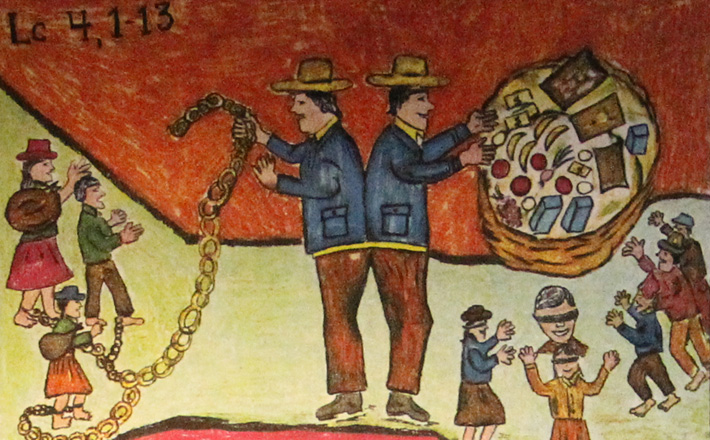Commentary on Romans 10:8b-13
Words. Whether we ponder them in our hearts or speak them for others to hear, publish them online or in texts to friends, scribble them onto shopping lists or adorn them with artistic flair, most of us operate with the currency of words.
We trade them back and forth in new ways and old, borrowing frequently without a second thought. (Even if you are careful about citing a source like this one, when was the last time you required a footnote for, say, the word “pencil” or the acronym OMG?)
In the days before online access was so pervasive, my spouse used to give dictionaries as graduation gifts, with the attached note: “Everything you’ll need to write in college is contained in this book.”
“The word is near you, on your lips and in your heart,” Paul says (Romans 10:8), quoting Deuteronomy.
Making sense of reality
The lectionary passage is situated in the middle of a section of Romans (chapters 9-11) that interpreters have struggled over the years to understand. Some consider these chapters to be parenthetical remarks that divert from the primary message of Romans, while others read them as being central to Paul’s argument as a whole.
I will leave aside those debates, except to note that Paul seems to be wrestling with a deeply troubling reality facing his own ministry. That is, although many Gentile listeners have responded to his good news of Christ crucified, most of his Jewish brothers and sisters have not.
Despite this baffling reality, Paul remains convinced of this truth: God can be trusted to keep God’s promises.
Old words for new settings
As he works out the implications of that conviction, Paul does what many preachers have done before and after him: he searches the scriptures for the right words and applies them to his own time and place.
The opening verses of our lectionary passage comprise the closing lines of Paul’s line-by-line interpretation of Deuteronomy 30:12-14 (found in Romans 10:6-9), in which Paul takes a passage that was originally about the Law and applies it to his own proclamation. Fully half of the six verses in the assigned pericope contain OT quotes; in addition to the one just mentioned, Paul quotes Isaiah 28:16 (Romans 10:11) and Joel 2:32 (Romans 10:13).
Whether in his own words or in words he has borrowed, Paul affirms promise upon promise: The word is near you…you will be saved…no one who believes in him will be put to shame (kataischuno = be disappointed; cf. Romans 5:5 “hope does not disappoint us”) … there is no distinction…everyone who calls on the name of the Lord shall be saved.” Everyone.
Verbal threads: mouths and hearts
Several verbal threads (that is, repetition of words) run through the passage. It may be a fruitful exercise for preachers to play with two of these words: stoma (mouth/lips) and kardia (heart). For example, note their internal (heart) and external (mouth) character, or consider how the words that people speak do or do not conform to their innermost thoughts and beliefs.
Paul seems to expect that God’s good news (“the word of faith which we preach”) actually gets inside of people. It is not simply something to be spoken (although, to be sure, it is also a spoken word), but it is a power that changes hearts and lives. Recall that in Paul’s day, the heart is the seat of physical, intellectual and spiritual life, including the will, emotions, and desires, while the mouth gives expression (or denies) what is in the heart. (Compare, for example, Jesus’ words in Matthew 7:21, “Not everyone who says to me, “’Lord, Lord’ will enter the kingdom of heaven, but only the one who does the will of my Father in heaven.”)
Along these lines, note the Gospel passage appointed for today (the temptation of Jesus according to Luke), in which Jesus and the devil engage in a verbal sparring match. Each of them quotes scripture, but only Jesus speaks with the integrity that connects lips and heart.
Belief and trust
Another verbal thread in our pericope is pisteuo (believe) and its cognate noun pistis (faith). For many people today, words like believing and faith suggest cognitive assent to something — whether or not the object of one’s belief is demonstrably true (such as “blind faith”). As noted above, however, Paul’s assertion is that the good news actually changes people. For one thing, it brings Gentiles and Jews together into the family of God. To “believe” in that assertion is something other than intellectual assent; rather, it is to be changed into a reality in which the long-time distinctions no longer apply.
Recall that pistis/pisteuo may also be translated by words such as trust, confidence, reliability, fidelity, etc. Substitute the word “trust” everywhere you read the word “believe” in the passage and you may hear Paul’s words sounding a slightly different tune. What might it look like actually to trust that God raised Jesus from the dead (Romans 10:9), and not simply to believe it? Or to trust in God and not only to believe about God?
Both and all
As we know from Paul’s other letters, the relationship between Jews and Gentiles in the church was not always an easy one, given differences in culture, values, belief-systems, etc. Nonetheless, Paul insists that the word of the gospel brings both groups into the family of God: Jews by virtue of the covenant, Gentiles by virtue of Christ, all by virtue of God’s promises.
Few congregations today face the precise questions that challenged Paul’s churches. Even so, there remain significant issues that divide believers from one another. Paul’s words may speak the gospel to those situations: “The same Lord is Lord of all and is generous to all who call on him, for ‘Everyone who calls on the name of the Lord shall be saved’” (Romans 10:12). From where you sit, what does it look like to trust that word?


February 14, 2016